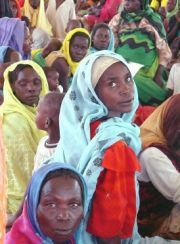ICRC warns of sharp decline in Sudan’s conflict-ridden Darfur
GENEVA, Feb 9 (AFP) — The situation in Sudan’s conflict-ridden Darfur region is deteriorating sharply, the international Red Cross warned Wednesday as it urged more foreign aid agencies to move into rural areas.

|
|
Sudanese women and children sit in front of a tent on the sand in the Kalma camp for internally displaced persons on the outskirts of the southern Darfur town of Nyala. (AFP). |
International Committee of the Red Cross (ICRC) Africa chief Christoph Harnisch said tribal conflicts and government-allied militia had locked rural communities in Darfur into “deep suspicion, violence, fear and lawlessness”.
“We are speaking about a severely deteriorating situation. There is no place for optimism as far as the Darfur conflictual dynamics are concerned,” he said after returning from Sudan.
Harnisch told journalists that while Sudanese authorities bore the primary responsibility for protecting the population, he was surprised by the lack of an international presence outside big camps and towns despite easier access.
“There is still not enough international humanitarian assistance in the rural areas. One of the surprises is that there are not many more actors in these areas,” he added.
“One of the ways to address protection is certainly to have more organisations there and really have systematic coverage there.”
The ICRC, which has concentrated on bringing relief aid to remote communities, said aid workers could talk with local militia or tribal leaders, or discourage attacks and pressure on the local population by their presence.
The western region of Sudan, which is the ICRC’s largest relief operation worldwide this year, covers an area the size of France and is stretching the agency’s resources.
About 2.5 million to three million people are estimated to be in need of food aid in Darfur this year as crops are left untended because of the violence and fear, according to relief agencies.
“Food shortages in 2005 will certainly involve most of the population in rural areas,” Harnisch said.
Tens of thousands of people have died in the past two years in Darfur, as the Sudanese government armed Arab militias known as Janjaweed to put down a revolt and about 1.6 million people fled their homes amid attacks on villages.
Harnisch said he saw no swift solution to strife in the region after organised attacks in 2003 and 2004 encouraged virtual anarchy, with Arab militias pitted against mainly African local populations or tribal ambitions being left unchecked.
“It has created a feeling of ‘do what you want’ by these Arab militias,” Harnisch said.
Rural communities were making deals to ensure they were untroubled, often paying “protection money” in the form of livestock or food, he added.
However, major population displacements like those experienced in the previous two years were likely to be over, and the conflict was now more about skermishes and harassment than outright war between government and rebel forces.
“Those populations who live in a precarious situation, because they are African, and they want to live in their areas, they fear reprisals and not extermination,” Harnisch said.
The ICRC had a “positive” attitude towards naming those in Sudan responsible for crimes against humanity.
But Harnisch also highlighted Khartoum’s role and cautioned that a “clear political” signal also had to be sent to all levels of society in Darfur to counter the culture of conflict there.
UN Secretary General Kofi Annan has called for those responsible for bloodshed to be brought before the International Criminal Court, something which Khartoum has rejected.
The ICRC report is the second in a few days to warn that the Darfur situation is getting worse.
The African Union’s special representative in Sudan, Saba Gana Kingibe, said Monday that security “had progressively deteriorated to appalling levels over the last four months, with unacceptable consequences to the peace and tranquility of the civilian populations.”
He blamed all sides to the conflict, but stated that “the worst perpetrators were mostly the (Janjaweed) who appeared to enjoy immunity from their inhuman and brazen acts of destruction of life and property wherever they struck.”
